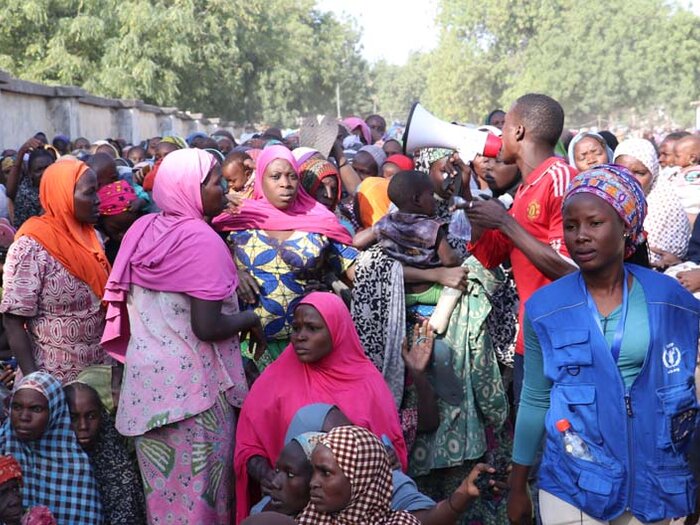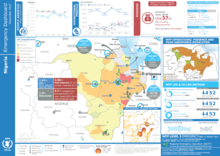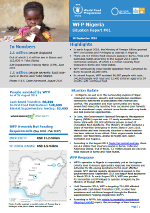Emergency
North Eastern Nigeria
- 4.4 million
- people facing acute hunger in Borno, Adamawa and Yobe states
- 2.2 million
- people internally displaced in the northeast
- US$271 million
- needed for WFP operations from December 2023–May 2024
Conflict and insecurity, rising inflation and the impact of the climate crisis continue to drive hunger in Nigeria – with 26.5 million people across the country projected to face acute hunger in the June-August 2024 lean season. This is a staggering increase from the 18.6 million people food insecure at the end of 2023.
Rising inflation, high food prices and food shortages across the country have left millions of people in Nigeria struggling to feed themselves. Widespread flooding, dry spells and desertification in the northeast are resulting in decreased crop production and limited grazing land for livestock.
Northeast Nigeria, the main area of WFP’s support, bears a heavy burden of food insecurity. Up to 4.4 million people in the states of Borno, Adamawa and Yobe will require food assistance during the June-August 2024 lean season, with over 1 million people facing emergency levels of hunger
WFP needs US$271 million for its operations from December 2023–May 2024.
What the World Food Programme is doing to respond to the North Eastern Nigeria emergency
-
Food assistance
-
WFP uses either food or cash transfers to support displaced people living in camps or with host communities, as well as vulnerable host populations. With diminishing resources, WFP is prioritizing its operations to reach 1.1 million vulnerable people every month in northern Nigeria.
-
Nutrition
-
WFP provides specialized nutritious food to children under 5 at risk of malnutrition, and pregnant and to nursing women. Jointly with UNICEF and NGO partners, WFP delivers essential health and nutrition services to prevent and treat acute malnutrition. Surveys in camps for internally displaced people in Borno State show a significant drop in malnutrition rates among the population supported by WFP and other humanitarian agencies. However, overall malnutrition figures remain very high, especially in the more remote, conflict-affected areas in the northeast.
-
Resilience
-
In collaboration with the Government of Nigeria and other partners, WFP is implementing livelihoods programmes and income-generating activities. We give cash to people in the short term, while providing training so displaced people can acquire skills and employment in the long term, in areas such as food processing, aquaculture, vegetable gardening, tailoring and carpentry.
-
Logistics and emergency telecommunications
-
The Emergency Telecommunications Service (ETS) provides internet connectivity in eight field locations. In Damasak, northeast Nigeria, the ETS is upgrading the UniFi devices – the internet access point – to the latest version so that humanitarian workers can use enhanced ETS services. Overall, ETS provides internet connectivity to 3,000 users from over 90 organizations, including many United Nations agencies and NGOs across northeast Nigeria.
-
UN Humanitarian Air Service (UNHAS)
-
WFP provides air transport to the entire humanitarian community, including helicopters to carry vital relief – vaccines, medicine, medical equipment and staff – to hard-to-reach, isolated areas. The United Nations Humanitarian Air Service (UNHAS), managed by WFP, was transporting over 3,700 passengers a month by the end of 2023. UNHAS was also transporting 10.2 mt of light humanitarian cargo each month, reaching 14 locations. UNHAS passenger and cargo services support more than 80 organizations in Nigeria.



